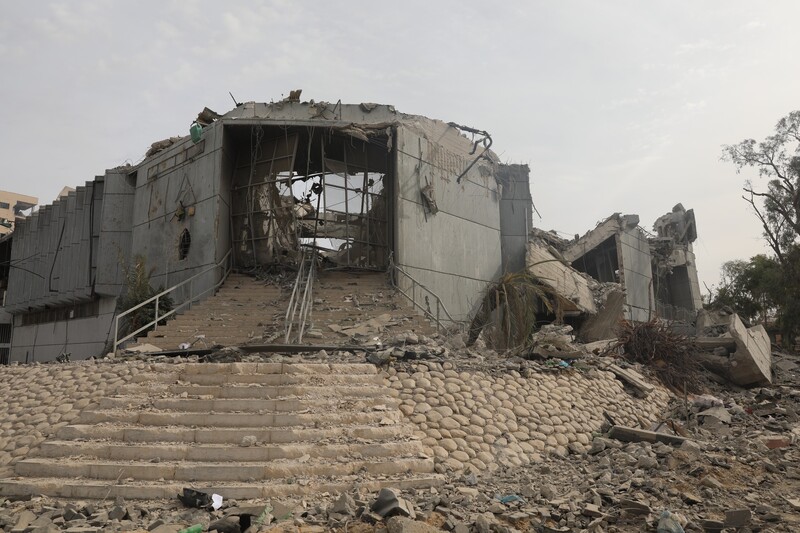The Electronic Intifada 14 December 2023

Israel destroyed the Rashad al-Shawa Cultural Center in Gaza, which hosted plays, film festivals and other cultural events. (Via Facebook)
The Rashad al-Shawa Cultural Center was where it all started for artist Anas Abu Aitah. The center was where, for years, Abu Aitah performed in the theater.
The center, located in Gaza City’s al-Rimal neighborhood, opened in 1985. It was named after Palestinian businessman Rashad al-Shawa, who served as mayor of Gaza in the 1970s.
Designed by Syrian architect Saad Mohafell, the three-story building was constructed in the brutalist style and had a library, roomy lounges to host cultural events and, most notably, the Great Theater.
During Israel’s attacks on Gaza, many Palestinians took shelter there. Then, Israel destroyed the center in an airstrike.
The center now lies in ruins.
Abu Aitah is devastated about the loss of the theater, as it was a place that showed more than what was “sad” about Gaza. It also showed its “beautiful reality.”
The Gaza Monologues
Abu Aitah took to the stage in October 2010 to perform in The Gaza Monologues at the Rashad al-Shawa Cultural Center.
The monologues were compiled by the Ashtar theater group as a response to Israel’s brutal attacks on Gaza from December 2008 to January 2009. Each monologue is in the voice of a young person from Gaza.
They tell of how they survived that war and how they are continuing to live under the Israeli siege.
Abu Aitah recalled that performing the monologues felt powerful, since he was able to help bring those words to life.
Recently, Ashtar encouraged people around the world to gather in groups and read the monologues.
In 2014 and 2015, Abu Aitah performed in a piece titled We Speak, about Palestinians’ experiences of displacement and death during Israel’s 2014 war on Gaza. It was also about how to preserve their dreams amid war.
Abu Aitah remembers the reactions of the audience during these performances. How he could feel both their sadness and joy.
Many attendees cried afterward.
He has now performed at many theaters throughout the Middle East, telling the stories of Palestinians living under occupation and siege, but his memories of those performances at the al-Shawa center are special.
After Israel’s destruction of the theater, he is unsure what will happen next.
Israel’s deliberate targeting of cultural landmarks
The al-Shawa center was much more than a theater. Every year, Palestinian vendors would gather there to sell paintings and other local crafts.
It was the hub of cultural and educational gatherings in Gaza: art exhibitions, film screenings and even school graduations.
“It was a hopeful place for all of us,” Abu Aitah said.
It also was the site of historic political events, such as when Yasser Arafat received Bill Clinton, at the time US president, there in December 1998.
The al-Shawa center was an important place for many Palestinian artists.
Palestinian director Khalil Mozain recalled on Facebook how the center hosted the 2016 Human Rights Film Festival.
Palestinian writer Aziz al-Masri told The Electronic Intifada that the center, which he called “one of Gaza’s oldest and largest cultural centers,” helped him become a writer and researcher on Palestinian history.
“The bombing and destruction of the center cannot be separated from the context of the central objective of the war, which is to destroy Gaza with all its social and cultural pillars,” he said.
It’s a major loss for the people of Gaza, he said. The center was “a genuine cultural platform” that helped shape Gaza’s culture for decades.
Al-Masri said that Israel’s destruction of the center is one more example of its targeting of Gaza’s landmarks.
Amjad Ayman Yaghi is a journalist based in Gaza.





